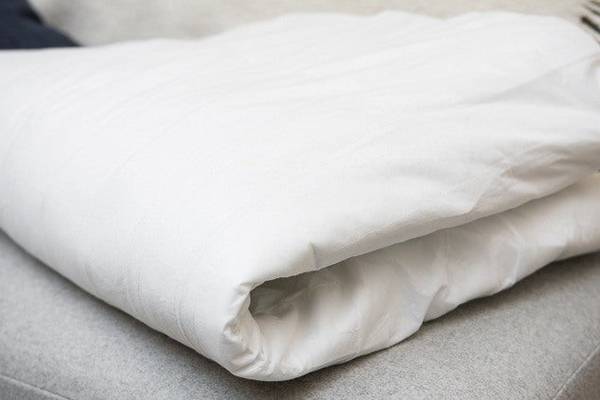
Static Electricity On Bed Sheets: Why Do My Bed Sheets Spark?
When you want to shock someone, just rub your feet on the carpet or your hands on some nice static electricity producing fabric. After you do that you should have a fun moment until someone does it back to you. But everyone draws the line when static electricity hits you when you are in bed.
Why do my bed sheets spark? Depending on the fabric you have in your bedsheets, the static electricity builds up through being tumbled dry or a high humidity level in your bedroom. Once you rub against those sheets you get a nice shock. This can happen when you get into bed at night or out of it in the morning.
To learn more about static electricity in your bedding just continue to read our article. It has the information you need in order to understand where that shock is coming from and how to avoid it. Take a few minutes to help protect yourself from a little shock at night.
Why do My Bed Sheets Spark at Night?

The main cause of this phenomenon is friction. Your dryer can build up enough friction in your sheets through the tumbling action. If you are not careful, that friction does not go away until after you have put the sheets on your bed and you get inside the covers.
Also, the friction your body creates as you toss and turn can help build up that static electricity and when you are not looking, you get a big shock as you get out of bed and start your day.
Then a third source for the static electricity can be caused by low humidity levels in your bedroom. The process is the same as rubbing your socks across a carpet. The friction creates static electricity and it won't go away until you touch something or someone.
No matter what you do you will always have friction around your bedding when it is on the bed. Even the rubbing of the blanket over the sheets can cause static electricity to build up. There are steps you can take to eliminate this problem.
Why do My Bed Sheets Have Static?
The biggest concern is friction. No matter how much you try and avoid rubbing carpets with your socks, the bedsheets with your body, and so on, static electricity finds a way to build up and give you a nice shock.
This build-up can come from simply making your bed and moving the blankets across your sheets like you normally do. Or you are not a sound sleeper that rarely moves during the night. Your tossing and turning can create enough friction to have static electricity build-up as you sleep.
Then when you get ready to get out of bed, you are given a very shocking wake up call. You will be awake and have no excuse for being late to work. Also, if you wear socks to bed, expect to see some static electricity build-up throughout the night.
The two fabrics will create enough juice to make sure your sleepy eyes are suddenly wide awake.
Is Static in Bed Sheets Dangerous?

In a word, no. Static electricity is just annoying and not dangerous at all. the reason for that conclusion is that while you may get a powerful charge that hurts a bit, the amperage is low and will not create a fire or do any other damage.
Yes, people have heard about static electric charges that have started fires but unless you have highly flammable materials in your bedroom, like gas, you should not have any worries.
To create a fire there is a long process involved which explains why some wood materials are very hard to light initially. A small static spark is not going to jump-start that process so you will be safe no matter how many shocks you get from your bedding.
If you are curious as to why your bedding started to shock you when you get into it, check the fibers of your bedding. It seems that polyester blankets on cotton sheets, etc., can cause a lot of sparks to fly. It is best to remove the polyester sheet from the mix and put another cotton one on top for warmth.
How to de Static Bed Sheets
The first way is to touch it and endure the shock. But that is only if you like feeling pain and enjoy the experience. usually, a good humidifier will help stop the sparks from flying at night. The air in your bedroom may be too dry and a humidifier will take care of both issues at the same time.
Another way is to see if you have a 100% polyester blanket on top of 100% natural fibers. Remove the polyester item to stop the build-up of electricity. Even if it is the softest blanket you have ever had, it does not mix well with natural fibers and the friction between the two will create more static electricity than you want to feel.
Next, you can rub a dryer sheet over your bedding before getting into bed. Or if one is not close at hand, you can use a metal hanger and do the same thing. In addition, a wet cloth rubbed over your bed sheets and blankets will also de static your bedding and make it more comfortable.
How do You Stop Static Electricity On Bed Sheets?

You just got some post laundry ideas that will help keep the static electricity from ruining your night. But you can also take some preventive steps while you are doing your laundry.
The first measure is to add 1 cup of vinegar to your rinse cycle and let the vinegar soften your sheets up enough so that the static cannot get a good foothold. The second preventive step you can take would be to eliminate using your dryer.
The sheets can get a lot of static electricity in them due to the dry heat as well as the friction. if you hang dry your laundry instead of using your dryer, you should be able to avoid static electricity build-up.
Next, you can spritz water on your bedding about 10 to 20 minutes prior to going to bed. This is done in place of using a wet cloth and wiping the bedding. All the extra moisture does is help stop the dry air and materials from creating more static electricity.
Finally, you can, and this is more for women than men, put some body lotion on your legs and arms. The extra moisture will help stop you from being shocked as you get into bed. For men, you may want to use the humidifier to make sure the moisture level is up throughout the room.
Make Bed Sheets Less Static

The previous sections have given you a lot of good ideas on how to cut down on static electricity build-up in your bedding. The humidifier and the elimination of the dryer steps are probably the best ones to use. Prevention is always better than a lot of different cures.
When you have time use the dryer sheet or the metal hanger to get the job done. Both methods only take a few minutes and that time is worth not being shocked before you sleep or get up.
One issue not mentioned is that if your bed is close to power cords, you may experience a lot of static electricity build-up. Move those cords away from your bed if you can or move your bed if that is possible.
If you think you have some static electricity build up in your body, wipe yourself down with a dryer sheet before going to bed. Dry air and fabric are great contributors to static electricity build-up.
Some Tips to Stop the Static Build-up
There are some tricks you can do to stop the static build up in your clothes or bedding. Here are just a few of them:
- 1. Hide a safety pin in your clothes or blankets - the metal should absorb the electricity for you. This can be done at almost any time.
- 2. Use metal hangers - slide the hanger over your clothes before you hang them up. This doesn’t take that long to do and helps you avoid being shocked later on.
- 3. Use a metal thimble - this does the same thing as the metal hanger and you just wipe it across your clothing.
- 4. Use hair spray - just lightly cover your clothes or bedding. The hair spray has anti static properties that work for your hair, it will work for your bedding as well.
Some Final Words
You do not have to put up with static electricity interrupting a good night’s sleep. All you have to do is make sure there is enough moisture in the air to prevent it from building up. Or use one of the tricks and tips mentioned above to solve your problem.

